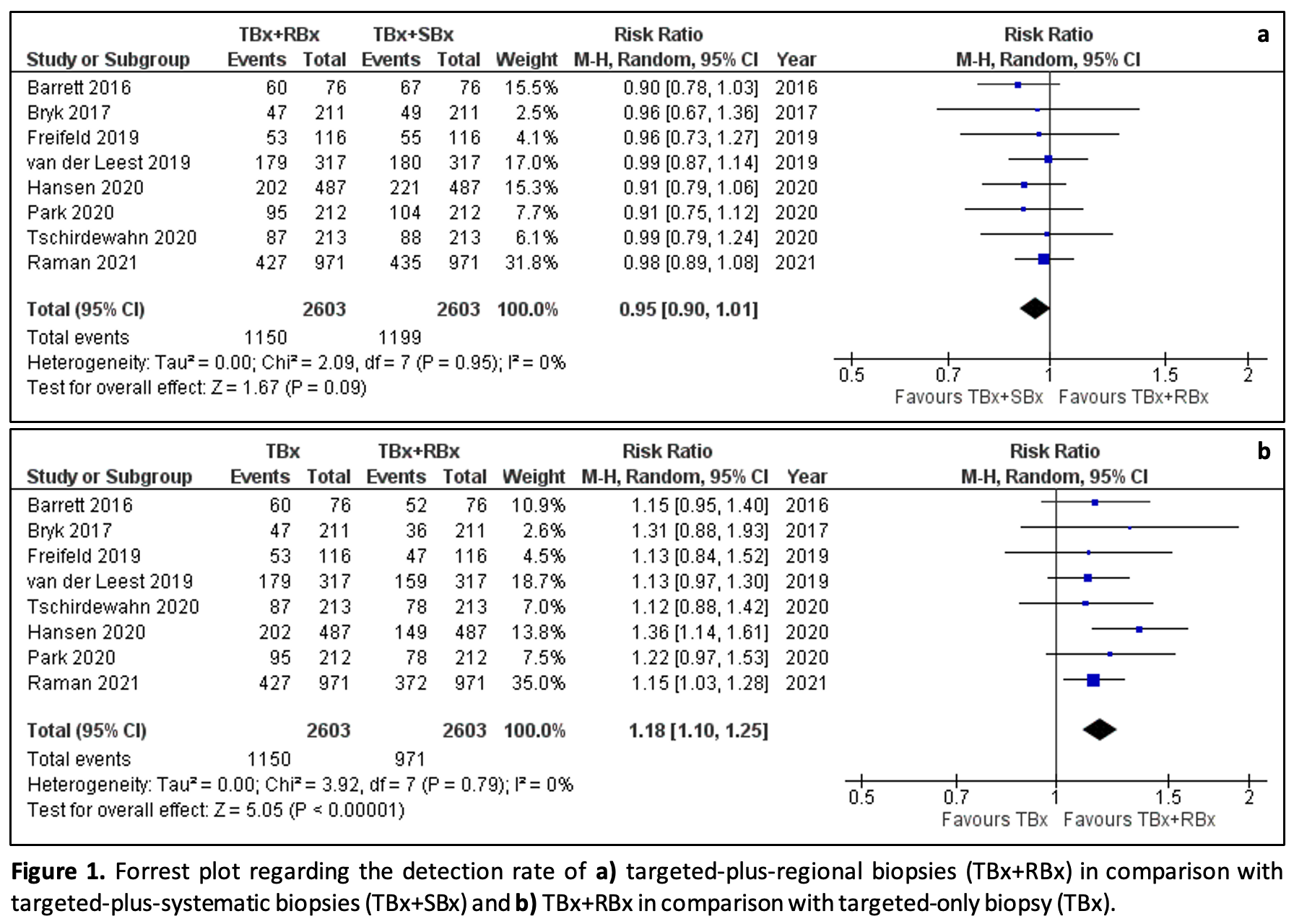Back
Poster, Podium & Video Sessions
Podium
PD17: Prostate Cancer: Detection & Screening III
PD17-12: Extended - targeted-plus-regional - MRI-directed biopsy approach in prostate cancer diagnosis – a systematic review and meta-analysis
Saturday, May 14, 2022
8:50 AM – 9:00 AM
Location: Room 252
Marinus Hagens*, Mar Fernandez Salamanca, Amsterdam, Netherlands, Anwar Padhani, Northwood, United Kingdom, Pim van Leeuwen, Henk van der Poel, Ivo Schoots, Amsterdam, Netherlands
- MH
Marinus Jan Hagens, MD (he/him/his)
Amsterdam University Medical Center
Podium Presenter(s)
Introduction: To systematically evaluate the diagnostic performance of MRI-directed targeted-plus-regional biopsy (TBx+RBx; index-test-1) and targeted-only biopsy (TBx; index-test-2) approaches in prostate cancer (PCa) suspected men, in comparison with the MRI-directed targeted-plus-systematic biopsy (TBx+SBx; reference-test) approach.
Methods: MEDLINE and EMBASE databases were searched according to the Preferred Reporting Items for Systematic Reviews and Meta-Analyses process (updated to August 2021). Identified reports were critically appraised to the Quality Assessment of Diagnostic Accuracy Studies (QUADAS-2) criteria. Detection of grade group (GG) =2 PCa was extracted as endpoint of interest. Random-effect meta-analyses were conducted to characterize summary effect sizes and quantify heterogeneity. Only MRI-positive men were included.
Results: A total of eight studies were included for analysis. There was no heterogeneity between studies. In a cumulative total of 2603 PCa suspected men, a non-significant difference between TBx+RBx and TBx+SBx was obtained in detection of GG=2 cancers (Risk Ratio (RR) 0.95 [95% CI 0.90-1.01; p=0.09)(Figure 1a). TBx+RBx, however, did significantly outperform TBx in detection of GG=2 cancers (RR 1.18 [95% CI 1.10-1.25]; p < 0.001) (Figure 1b). These results were obtained by 3-4 targeted and 4-10 regional cores, avoiding contralateral systematic biopsies.
Conclusions: A TBx+RBx approach detected equivalent GG=2 cancers in comparison with the recommended practice of TBx+SBx, subsequently minimizing biopsy cores. Prospective clinical trials are needed to substantiate the arguments to obviate additional systematic biopsies currently recommended for the diagnostic work-up in men with positive MRI scans.
Source of Funding: None.

Methods: MEDLINE and EMBASE databases were searched according to the Preferred Reporting Items for Systematic Reviews and Meta-Analyses process (updated to August 2021). Identified reports were critically appraised to the Quality Assessment of Diagnostic Accuracy Studies (QUADAS-2) criteria. Detection of grade group (GG) =2 PCa was extracted as endpoint of interest. Random-effect meta-analyses were conducted to characterize summary effect sizes and quantify heterogeneity. Only MRI-positive men were included.
Results: A total of eight studies were included for analysis. There was no heterogeneity between studies. In a cumulative total of 2603 PCa suspected men, a non-significant difference between TBx+RBx and TBx+SBx was obtained in detection of GG=2 cancers (Risk Ratio (RR) 0.95 [95% CI 0.90-1.01; p=0.09)(Figure 1a). TBx+RBx, however, did significantly outperform TBx in detection of GG=2 cancers (RR 1.18 [95% CI 1.10-1.25]; p < 0.001) (Figure 1b). These results were obtained by 3-4 targeted and 4-10 regional cores, avoiding contralateral systematic biopsies.
Conclusions: A TBx+RBx approach detected equivalent GG=2 cancers in comparison with the recommended practice of TBx+SBx, subsequently minimizing biopsy cores. Prospective clinical trials are needed to substantiate the arguments to obviate additional systematic biopsies currently recommended for the diagnostic work-up in men with positive MRI scans.
Source of Funding: None.


.jpg)
.jpg)